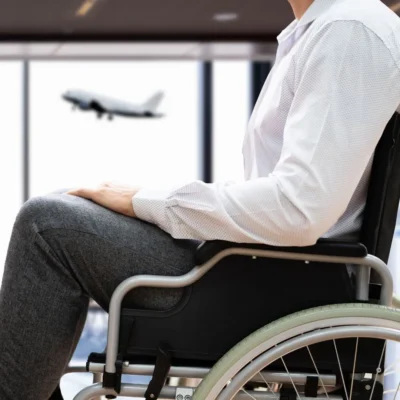Exploring the world around you and opening yourself up to new destinations can be a truly rewarding experience. Whether it be for work, visiting family, or just for fun, travel can deeply enrich our lives. However, for those living with a spinal cord injury, the idea of traveling can be daunting and even discouraging, with all of the different elements to consider and worries of inaccessibility. We are here to tell you that these obstacles do not have to stop you from traveling and living the life you want to live. With the right knowledge and planning, your hesitations about traveling will be a thing of the past. To help make your next trip smooth and worry-free, here are four of our top tips for traveling with a spinal cord injury.
Consult With Your Doctor Before Traveling With A Spinal Cord Injury
Before you head to the airport and start your trip, it is important to check with your doctor first if there may be any concerns that could interfere with your travel plans. Some locations may have extreme temperatures or infections that may affect you and your injury, or you could be dealing with some complications of your injury that could make it unsafe for you to travel. The last thing your doctor wants is to stop you from getting to the things you love, so if they bring up serious concerns, it is best to listen to them. If you get medical clearance from your doctor to go, then you are all good to set out on your trip!
Explore Accessible Transportation
Now that you have medical clearance to travel, it’s time to start taking a look at the accessibility options for both your transportation and trip accommodations. Some airlines have restrictions on the kinds of mobility aids they allow, so always be sure to confirm any aids you use are permitted. Find out if your designated airports have accessibility features, such as ramps, elevators, specific security lanes, or others to make your travel process as smooth and worry-free as possible. Also consider your transportation to and from the airport, and find the option that best fits your needs. If you are staying in a hotel at your destination, it is always a good idea to check the hotel’s website for available accessibility options both in your room and the building as a whole. If you are unsure, always call and speak to the hotel staff directly to confirm you will have everything you need. This way, all you have to do is focus on enjoying your trip.
from the airport, and find the option that best fits your needs. If you are staying in a hotel at your destination, it is always a good idea to check the hotel’s website for available accessibility options both in your room and the building as a whole. If you are unsure, always call and speak to the hotel staff directly to confirm you will have everything you need. This way, all you have to do is focus on enjoying your trip.
Look for Accessible Activities
If you are taking a vacation and want to find fun things to do in your destination, looking for activities with accessible options is a great way to optimize your trip. You can do this research before you arrive or ask about accessibility while you are there as spontaneous activities come up. Most museums, tours, theaters, certain outdoor trails, fun restaurants, and much more have become widely accessible in recent years, so whatever you want to do, there are most likely accessibility features available that will let you do it. The world is your oyster!
Reach Out For Advice and Support
If you are feeling unsure about traveling or if it is your first time traveling with your spinal cord injury, reaching out to others for support and advice is a wonderful way to ease those fears. Speaking to others who are living with spinal cord injuries can help you understand the process of travel with your disability, some of the things you might encounter, and what types of activities are accessible in your destination. Don’t know anyone with a spinal cord injury like yours? There are plenty of support and empowerment groups online and in person for you to get to know others who understand where you are coming from. Plus, it can be incredibly encouraging to hear others’ positive experiences with travel. Do not hesitate to reach out.
A spinal cord injury creates a new normal for you, and we want you to know that if you want travel to be a part of that normal, you should never have to worry about any roadblocks in the way. Whether you want to incorporate travel into your life, transition into the workforce, find new opportunities for building community, or just get to know others with spinal cord injuries and share your experiences, Delta Center is here for you. The Delta Center Endeavor Program is run by our Independent Living Specialist, Michael Anderson, who himself is living with a spinal cord injury, and was created to support individuals with this type of injury in a variety of ways. We offer services for addressing personal care needs, advocacy, mental health and social support, peer mentoring, and so much more. Whether your injury happened decades or weeks ago, the Endeavor Program is here to help you access the best resources and build community with others in your position. We understand firsthand the effects spinal cord injuries can have on your life and are dedicated to supporting you in your journey toward living well in your new normal. For more information about our Endeavor Program, visit the Program’s webpage here.

